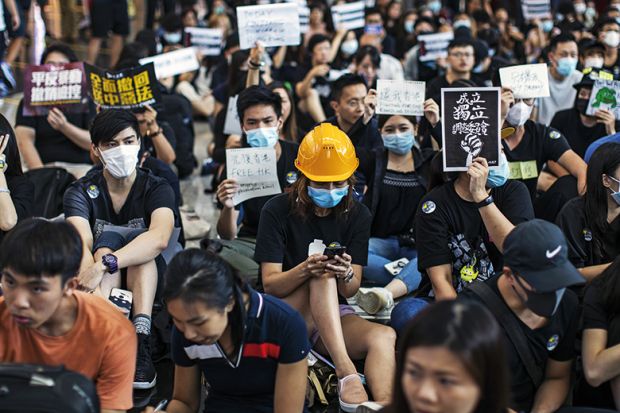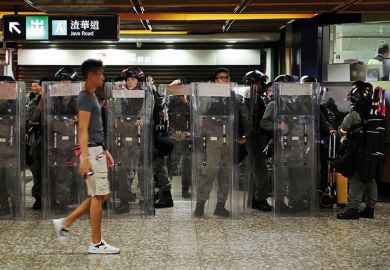When Peter Mathieson stepped down as vice-chancellor of the University of Hong Kong to join the University of Edinburgh in 2018, he described how he had handled the pressure of his former role.
As an outsider, he felt that he had certain advantages in navigating tricky waters such as Occupy Central, which in 2015 saw students at the centre of protests over Beijing influence (and which foreshadowed the turmoil, if not the violence, of the current protests).
“I had no political affiliations, I had no historical links with any particular viewpoint, I had no business or personal interests in Hong Kong, so I could be completely unfettered by any other consideration apart from the best interest of the university,” he said in an interview with Times Higher Education.
If the cauldron in which Mathieson found himself was a hot one, it has reached boiling point this year, and in our cover story we explore the implications for Hong Kong’s universities.
In one incident that reflects the severity of the situation, a student at The Hong Kong University of Science and Technology died after suffering a brain injury during a protest – a tragedy that moved the HKUST president Wei Shyy to tears during a moment of silence at a graduation ceremony.
As this amply illustrates, the ability of university leaders to remain detached and neutral is being severely tested, and the pressure from students, staff, politicians and other actors is intense, conflicting and perhaps unresolvable.
If Hong Kong is an extreme example, the sense that university leaders are increasingly being asked to walk a political tightrope is relevant much more widely.
In the US, universities have had to contend with the erratic, frequently malevolent interventions of Donald Trump and his increasingly fraught relations with other countries – from the travel ban imposed on mainly Muslim countries in 2017 to escalating tensions with China.
In the UK, universities entered the political fray as opponents of Brexit – and found themselves at odds with half of society, as well as the government and large parts of the media.
So how political can, or should, vice-chancellors be in this fraught environment?
And how realistic is it to maintain distance and objectivity, given the political views and activism of students and staff, and the fact that universities are increasingly seen by governments as powerful tools in their quest for economic realignment?
In our news pages, we consider how universities, scholars and students from countries with very different political traditions are interacting.
For some, including the authors of a report by the UK’s Foreign Affairs Committee, universities are on the front line of the geopolitical wrangling – particularly vulnerable because of the large numbers of international students from China and elsewhere, on whom they are financially reliant.
For others, such as Bill Rammell, a former higher education and Foreign Office minister, the concerns are overblown. Rammell, who will step down as vice-chancellor of the University of Bedfordshire next month, tells us that while there are “risks that need to be managed”, he has seen no evidence to substantiate claims of foreign interference – or even excessive influence – in UK universities.
“China is soon going to be the second biggest global superpower – we can stand apart from it or engage,” he says. “Educating thousands of Chinese students and explaining how liberal traditions are core to an academic education can only help move China towards a more progressive direction.”
The idea that sending almost a million young people abroad each year to study in Western universities is a form of mind control does seem an odd one. But there is no escaping the financial shock that the Saudi government inflicted on Canadian institutions when it summarily pulled scholarships in response to an unfavourable tweet from a Canadian politician.
And negotiating the politics of the Hong Kong situation is very much on UK vice-chancellors’ agenda, given that 16,000 Hong Kong students study in the UK alongside 100,000 from mainland China.
For university leaders, finding their way through this political minefield is now the new normal.
Perhaps, like Mathieson in Hong Kong, they must focus on just one question: what is in the best interests of the university? But that does not remove politics from the equation.
International diplomacy is now a prerequisite on the extensive list of attributes for the job.
POSTSCRIPT:
Print headline: Don the diplomat’s hat
Register to continue
Why register?
- Registration is free and only takes a moment
- Once registered, you can read 3 articles a month
- Sign up for our newsletter
Subscribe
Or subscribe for unlimited access to:
- Unlimited access to news, views, insights & reviews
- Digital editions
- Digital access to THE’s university and college rankings analysis
Already registered or a current subscriber?



